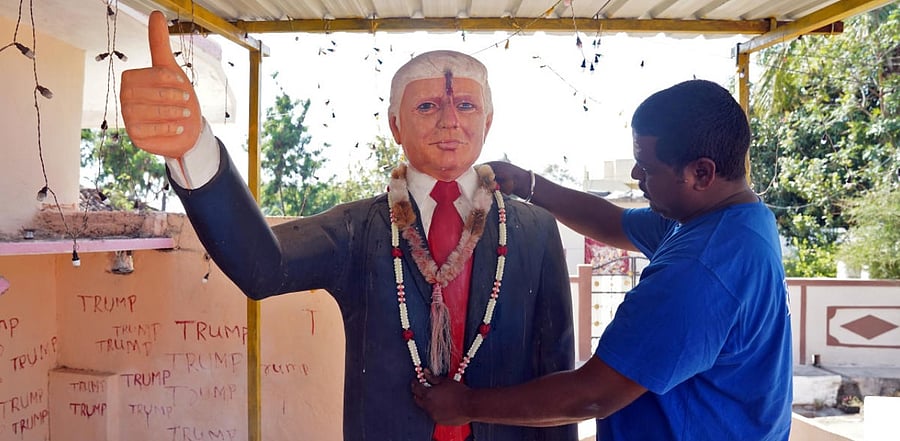
In India, where many admire President Donald Trump, one rural farmer worshipped him like a god, praying to a life-size statue of Trump in his backyard every morning.
“At first everyone in the family thought he was mentally disturbed, but he kept at it and everyone eventually came around,” said Vivek Bukka, a cousin of the farmer, Bussa Krishna.
When Trump announced he had the coronavirus, it devastated Krishna. The farmer posted a tearful video on Facebook in which he said: “I feel very sad that my god, Trump, has contracted the coronavirus. I ask everyone to pray for his speedy recovery.”
He stopped eating to show solidarity with his idol’s suffering from Covid-19, his family said. He fell into a deep depression. On Sunday, he died of cardiac arrest.
Krishna’s devotion had made him into a minor celebrity, and he was the subject of some national headlines. His death made news across India.
Vivek said his cousin had been physically fit and had no health problems or a history of heart disease. There is no evidence linking Krishna’s death to his fasting.
There is no indication that the White House or Trump — who said he had recovered from the virus and felt “powerful” after being treated with a cocktail of drugs — was aware of his biggest fan in India. Many of the country’s urban intellectuals dislike the US president, and he is regularly mocked on Indian social media platforms.
But the president has support in other corners of Indian society. A February study by the Pew Research Center found that 56 per cent of people surveyed in India said that Trump would “do the right thing when it comes to world affairs,” up from 16 per cent when he was elected.
Trump’s popularity in some parts of India is striking because the cult of personality he has tried to cultivate — of an unapologetically brash figure leading the United States to a bright new future while espousing “America First” — mirrors how India’s prime minister, Narendra Modi, projects himself to his own supporters.
Krishna, a widowed farmer in his thirties who lived in the village of Konne in the southern state of Telangana, had been a Trump devotee for about four years. He became a fan when the president appeared to him in a dream, his relatives said, and predicted that India’s national cricket squad would beat its archrival, Pakistan, in a match the next day.
India won, Vivek said, “and from that day he started worshipping Donald Trump.”
But the farmer also admired the president as a leader, said Vivek, a 25-year-old accountant who lives near the southern city of Hyderabad. His cousin did not speak English, and the local news outlets where he lived paid scant attention to US politics. So he relied on Vivek to translate articles and videos for him.
Vemula Venkat Goud, Konne’s village headman, said that the young farmer had also been drawn to Trump’s “straightforward ways and blunt speech.”
Neighbours did not know much about US politics and had no opinion of Trump, he added. But since Krishna was such a huge fan, they embraced his cause as a courtesy, even if it struck them as a little odd.
As Krishna’s devotion to Trump intensified, he began fasting every Friday in support, and he commissioned the construction of a shrine in his backyard with the life-size statue, Vivek said. He worshipped it with Hindu rituals for an hour or two each morning, as one might when praying to Krishna, Shiva, Ganesha or other gods in the Hindu pantheon.
One video of Krishna that has circulated widely online shows him performing a prayer ritual, or pooja, before an altar that holds a picture of Trump.
In another, he wears a T-shirt that reads “Trump” in white block letters as he pours water over the head of the statue, which is wearing a red tie and giving a thumbs-up. The Trump statue has a garland of fresh flowers around its neck and a red tilak — a traditional symbol that is made of vermilion or sandal paste, and used in religious ceremonies — on its forehead.
Krishna’s creation of a statue in Trump’s likeness is not unique. An architect built a giant wooden statue of Trump with vampire’s teeth in Slovenia, the native country of the first lady, Melania Trump. Some critics denounced it as a “waste of wood.”
That statue’s creator, Tomaz Schlegl, an architect, had a clear vision, and message, in mind. “I want to alert people to the rise of populism, and it would be difficult to find a bigger populist in this world than Donald Trump,” he told Reuters.
A life-size wooden sculpture of Trump near the town of Sevnica in eastern Slovenia, where she grew up, was set on fire. The commissioning artist replaced it with a bronze statue.
As for Krishna, he made a valiant attempt to meet his idol. He travelled to the US Embassy in New Delhi before Trump’s trip to India in February to try to arrange a meeting, Venkat, the village headman, said.
“It’s really sad that his dream never came true,” he added.
Trump later addressed a stadium packed with 100,000 cheering attendees in Ahmedabad, the heart of Modi’s political home base.
Krishna kept the faith until the end.
When he learned of Trump’s coronavirus diagnosis, he locked himself in his room, Vivek said.
“We tried to force him to eat, but he barely ate anything,” he said.
On Sunday, Krishna collapsed, and his relatives took him to the hospital. He was pronounced dead on arrival.
Krishna is survived by his parents and his 7-year-old son.
Venkat said villagers were discussing how best to maintain their neighbour’s Trump shrine.